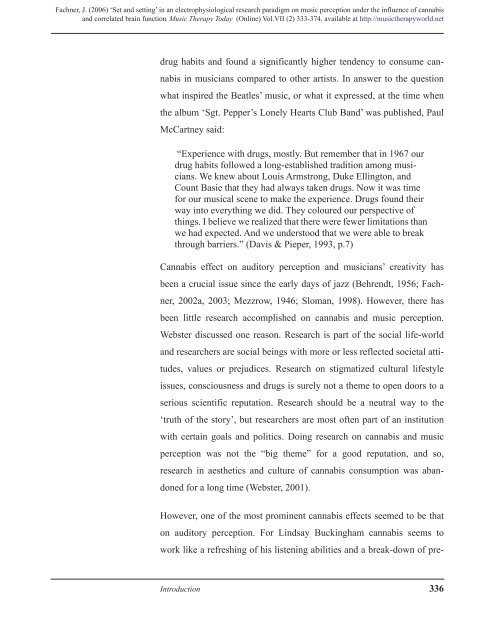Music Therapy Today - World Federation of Music Therapy
Music Therapy Today - World Federation of Music Therapy
Music Therapy Today - World Federation of Music Therapy
You also want an ePaper? Increase the reach of your titles
YUMPU automatically turns print PDFs into web optimized ePapers that Google loves.
Fachner, J. (2006) ‘Set and setting’ in an electrophysiological research paradigm on music perception under the influence <strong>of</strong> cannabis<br />
and correlated brain function. <strong>Music</strong> <strong>Therapy</strong> <strong>Today</strong> (Online) Vol.VII (2) 333-374. available at http://musictherapyworld.net<br />
drug habits and found a significantly higher tendency to consume can-<br />
nabis in musicians compared to other artists. In answer to the question<br />
what inspired the Beatles’ music, or what it expressed, at the time when<br />
the album ‘Sgt. Pepper’s Lonely Hearts Club Band’ was published, Paul<br />
McCartney said:<br />
“Experience with drugs, mostly. But remember that in 1967 our<br />
drug habits followed a long-established tradition among musicians.<br />
We knew about Louis Armstrong, Duke Ellington, and<br />
Count Basie that they had always taken drugs. Now it was time<br />
for our musical scene to make the experience. Drugs found their<br />
way into everything we did. They coloured our perspective <strong>of</strong><br />
things. I believe we realized that there were fewer limitations than<br />
we had expected. And we understood that we were able to break<br />
through barriers.” (Davis & Pieper, 1993, p.7)<br />
Cannabis effect on auditory perception and musicians’ creativity has<br />
been a crucial issue since the early days <strong>of</strong> jazz (Behrendt, 1956; Fach-<br />
ner, 2002a, 2003; Mezzrow, 1946; Sloman, 1998). However, there has<br />
been little research accomplished on cannabis and music perception.<br />
Webster discussed one reason. Research is part <strong>of</strong> the social life-world<br />
and researchers are social beings with more or less reflected societal atti-<br />
tudes, values or prejudices. Research on stigmatized cultural lifestyle<br />
issues, consciousness and drugs is surely not a theme to open doors to a<br />
serious scientific reputation. Research should be a neutral way to the<br />
‘truth <strong>of</strong> the story’, but researchers are most <strong>of</strong>ten part <strong>of</strong> an institution<br />
with certain goals and politics. Doing research on cannabis and music<br />
perception was not the “big theme” for a good reputation, and so,<br />
research in aesthetics and culture <strong>of</strong> cannabis consumption was aban-<br />
doned for a long time (Webster, 2001).<br />
However, one <strong>of</strong> the most prominent cannabis effects seemed to be that<br />
on auditory perception. For Lindsay Buckingham cannabis seems to<br />
work like a refreshing <strong>of</strong> his listening abilities and a break-down <strong>of</strong> pre-<br />
Introduction 336

















